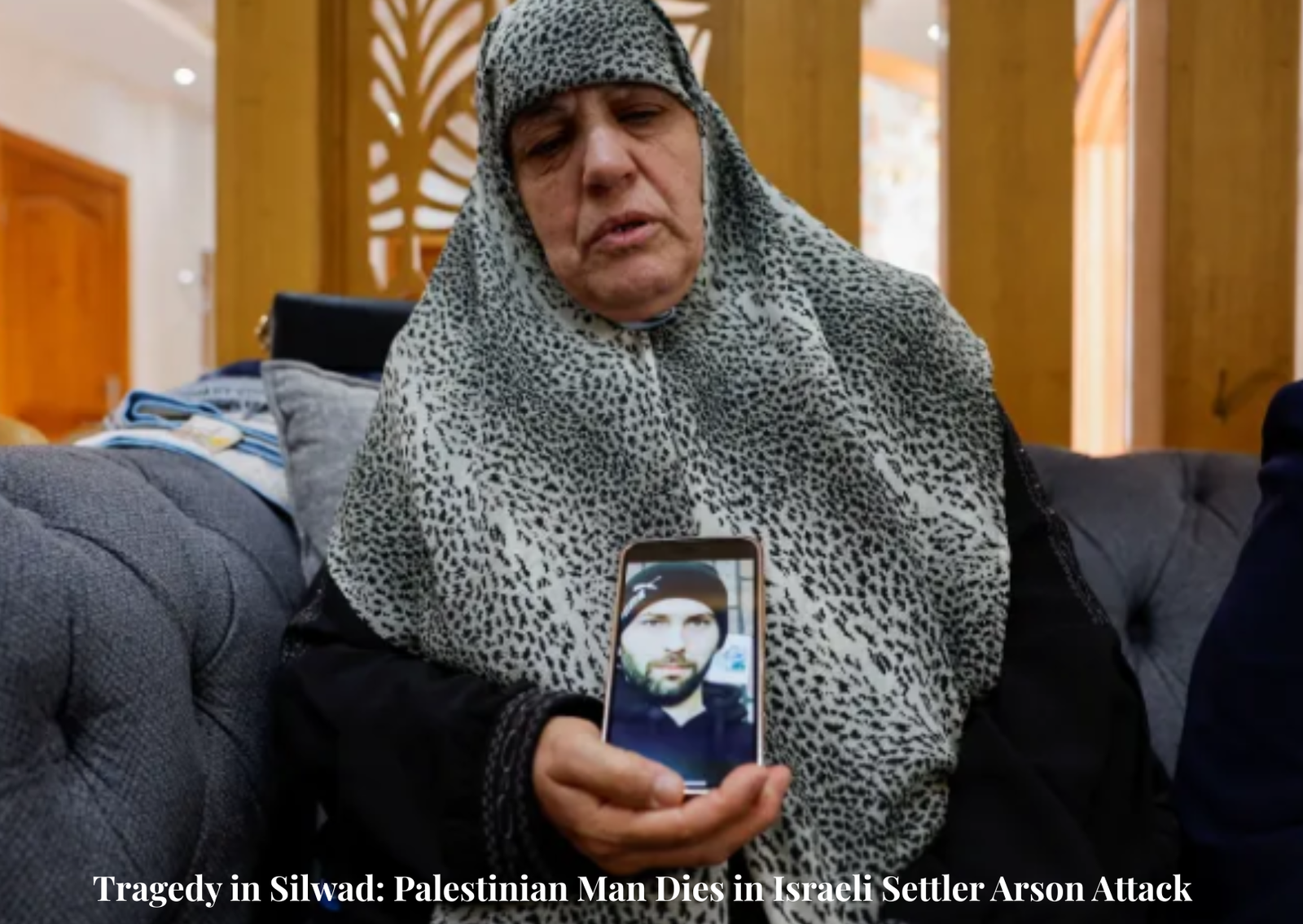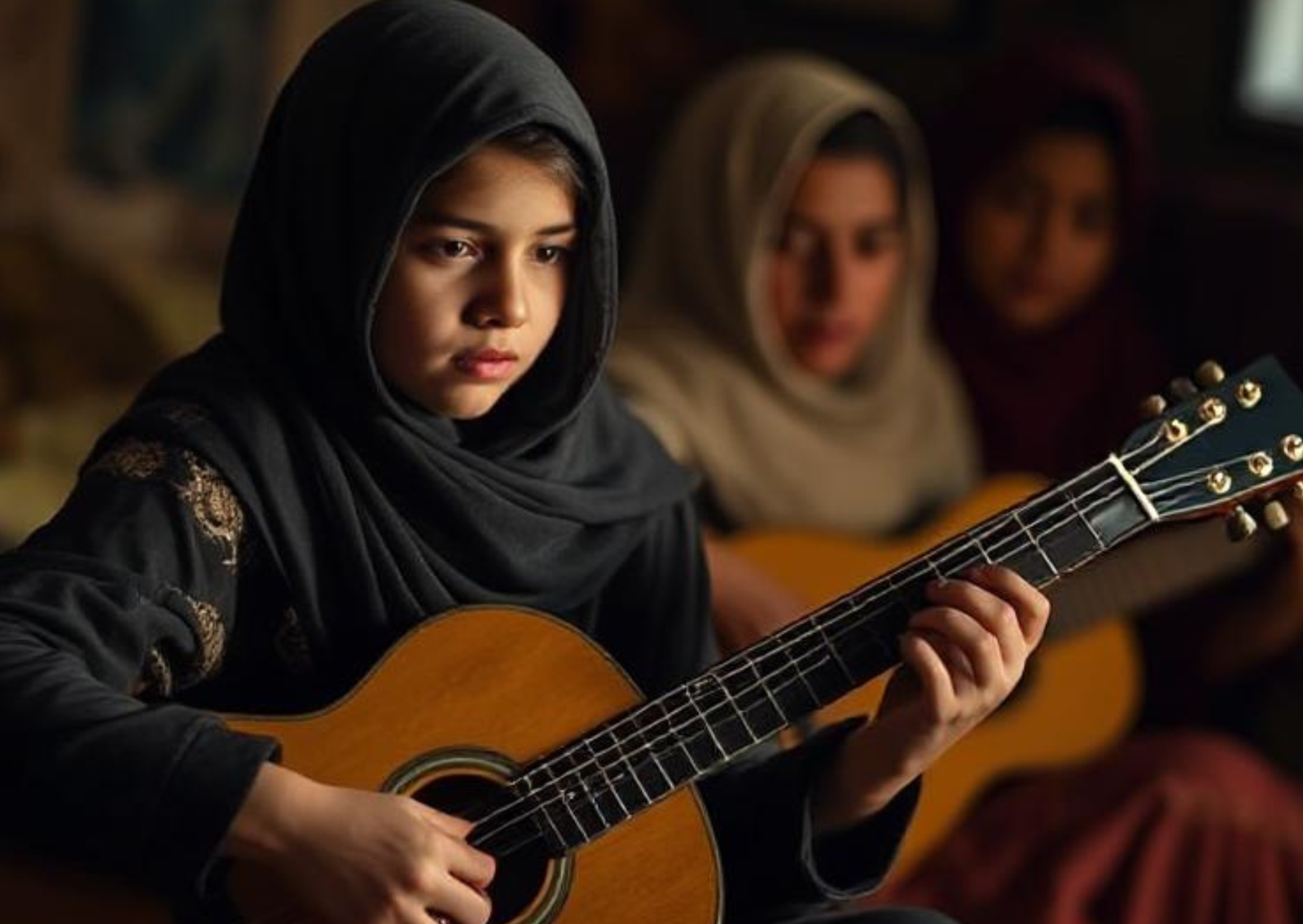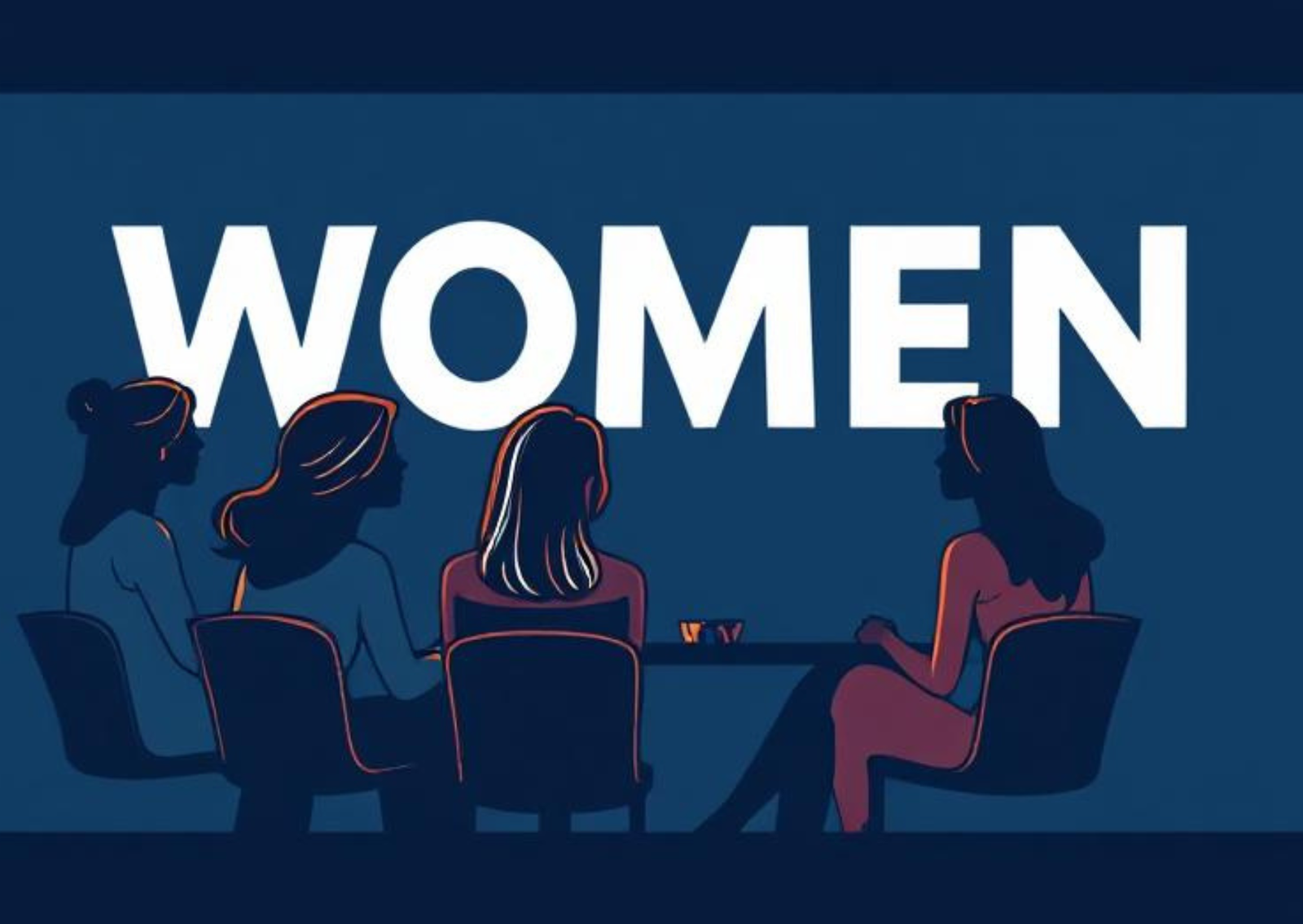In the early hours of July 31, 2025, flames engulfed the quiet Palestinian town of Silwad. Amid the smoke and chaos, Khamis Abdel-Latif Ayyad, a 40-year-old father, lost his life while trying to save his brother’s car from the inferno. His tragic death caused by smoke inhalation during a violent Israeli settler arson attack is now the most recent emblem of unchecked brutality in the occupied West Bank.
This harrowing incident isn’t an isolated case. It’s a chilling continuation of a pattern of aggression where Israeli settlers, often accompanied or shielded by the Israeli military, have increasingly targeted Palestinian civilians and property with impunity.
Palestinian Man Dies After Silwad Attacks: What Happened?
According to the Palestinian Ministry of Health, Khamis Ayyad died from smoke inhalation after settlers set fire to vehicles and homes around 2 a.m. in the town of Silwad, northeast of Ramallah. Eyewitnesses, including his relatives, described how neighbors awoke to a scene of panic and destruction.
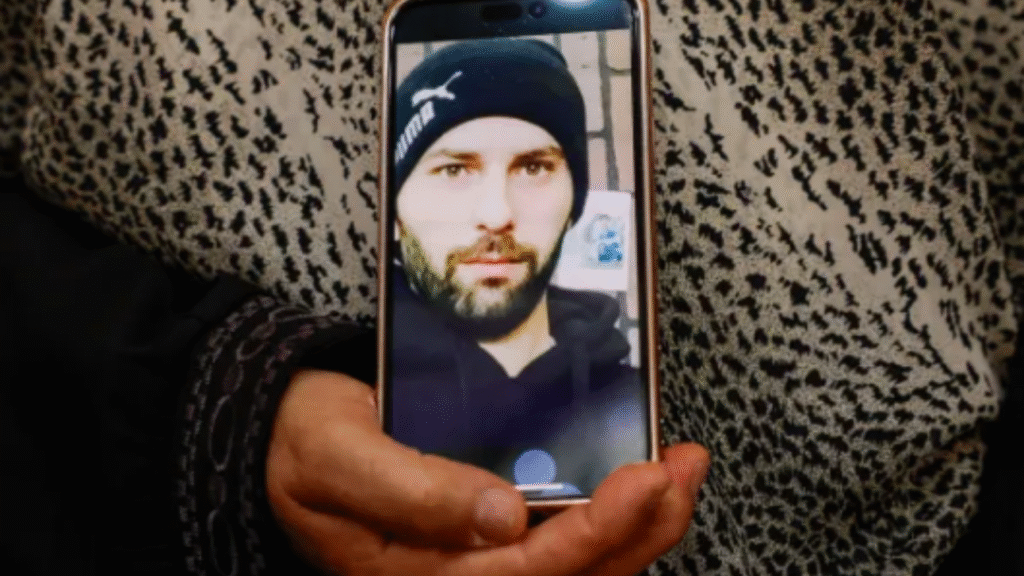
“We woke up to flames devouring vehicles across the neighborhood,” a family member said. “Khamis rushed out to help. He was trying to save his brother’s car when the smoke overwhelmed him.”
The attack spread beyond Silwad. Settlers also targeted Khirbet Abu Falah and Rammun, setting more vehicles ablaze, and later vandalized a car repair shop in Bazariya, northwest of Nablus.
Pattern of Escalation: Settler and Military Violence in the West Bank
The death of Khamis Ayyad comes amidst an ongoing surge of settler-led violence, fueled by nationalist ideology and the Israeli government’s increased right-wing tilt. According to UN OCHA, between January and July 2025, over 159 Palestinians were killed by Israeli forces in the West Bank.
Additionally, the UN reported at least 27 settler attacks that led to casualties and property damage within just a single week (July 15–21). These figures highlight a systematic escalation of violence.
In Silwad alone, this was the fourth attack in just one week.
Israeli Settler Impunity: A Growing International Crisis
Ayyad’s death also comes days after the killing of Awdah Hathaleen, a Palestinian activist from Masafer Yatta and co-creator of the Oscar-winning documentary No Other Land. He was shot by a settler and the accused, Yinon Levi, was placed under house arrest, sparking outrage from rights groups.
This has intensified scrutiny over how Israeli settlers evade accountability, often with support or passive tolerance from the Israeli state.
“They burned whatever they could and ran away,” said Raafat Hussein Hamed, whose home was destroyed during the Silwad attack.
Political Context: Calls for West Bank Annexation
Adding fuel to the fire, Israeli ministers Yariv Levin and Israel Katz issued a joint statement on the same day of Ayyad’s death, urging the state to seize the opportunity to annex the West Bank.
This rhetoric was amplified by a Knesset vote earlier this month, where lawmakers overwhelmingly backed a motion to annex large parts of the occupied territory.
Using settler violence as a de facto tool of displacement, Israel’s push toward de jure annexation now seems more coordinated than ever.
Voices from the Ground: Fear and Helplessness in Silwad
Residents in Silwad are still grappling with shock and grief. Khamis’s mother, Haleema Ayyad, was seen holding his photo tightly as she mourned her son’s loss.
“He died helping. That’s who he was he never turned away from people in need,” she said in a trembling voice.
Several others from Silwad echoed a sense of despair. With police investigations yielding no arrests and military patrols arriving late, most Palestinians fear that justice won’t come.
Photo Evidence and Visual Reports
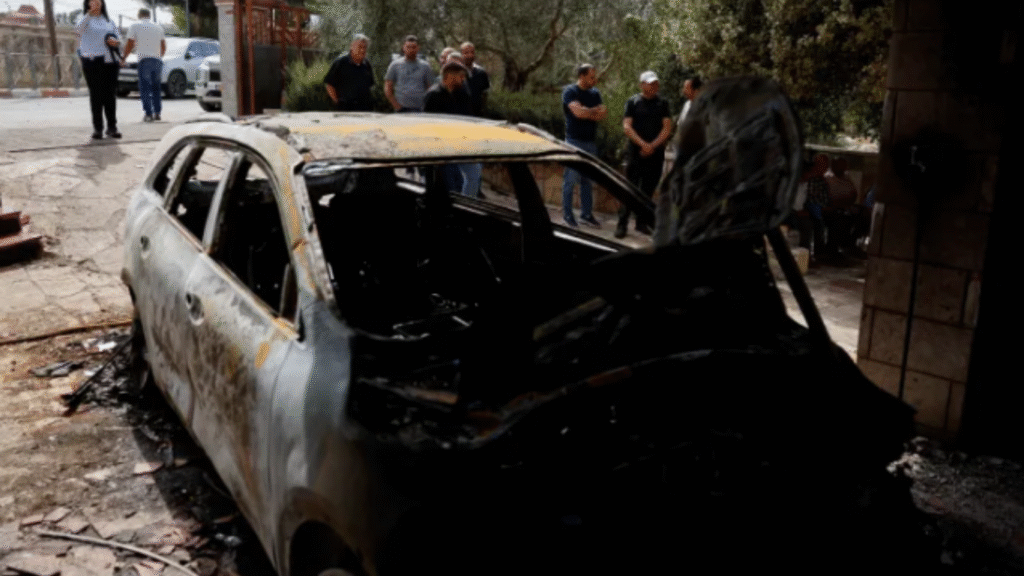
Images from Reuters’ Ammar Awad captured harrowing scenes:
- Burned-out vehicles line the streets of Silwad.
- Families sifting through charred belongings.
- Mothers weeping while holding portraits of lost sons.
These visuals have since gone viral across social platforms, amplifying international calls for accountability.
International Response: Growing Calls for Sanctions
In light of these incidents, several human rights organizations and international leaders have demanded:
- Sanctions against violent Israeli settlers.
- Independent investigations by UN special rapporteurs.
- A halt to U.S. military aid that is used to enforce occupation policies.
Groups like Amnesty International, Human Rights Watch, and B’Tselem have highlighted settler violence as a form of state-backed terrorism.
Why This Matters: Human Cost and the Bigger Picture
The death of Khamis Ayyad is not merely a tragedy for his family it symbolizes a dangerous tipping point in the Israeli-Palestinian conflict. The normalization of settler violence and state complicity threatens not just peace, but basic humanity in the region.
Each attack, each loss, deepens the divide and extinguishes hope for justice.
Key Facts of the Silwad Arson Attack
| Detail | Information |
|---|---|
| Victim | Khamis Abdel-Latif Ayyad, 40 |
| Cause of Death | Smoke inhalation during settler-led fire |
| Location | Silwad, northeast of Ramallah |
| Date | July 31, 2025 |
| Other Attacked Areas | Khirbet Abu Falah, Rammun, Bazariya |
| Response by Israeli Authorities | No arrests; suspects fled before troops arrived |
| International Response | Calls for settler sanctions and independent probes |
| Political Backdrop | Israeli ministers push for annexation of West Bank |
Demand for Justice Must Be Louder Than Flames
As Palestinians bury yet another victim of settler violence, the silence or apathy of the international community becomes complicit. The story of Khamis Ayyad should not fade into statistics or hashtags. It must remain a beacon calling for global conscience, reform, and resistance.
Publish By: Woman One Network | w1network.org
At Woman One Network, we stand for truth, justice, and the voices often unheard. This post is part of our News section, covering high-impact global stories through the lens of real people. From Silwad to Sana’a, our mission is to deliver stories that matter.

